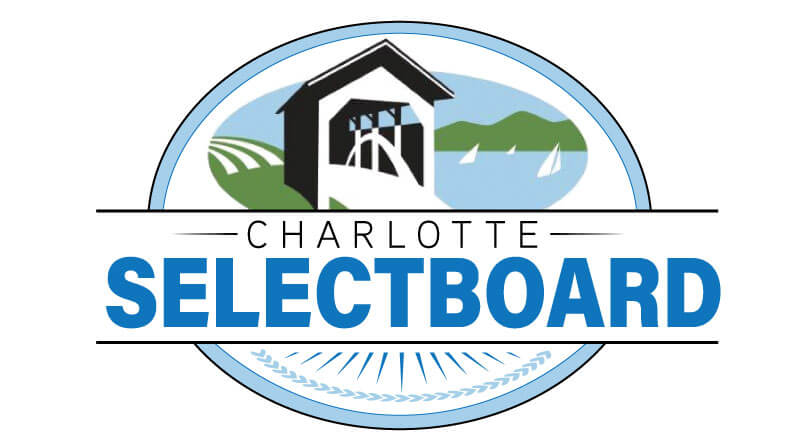Property tax bills going up even with no rise in tax rate
[vc_row][vc_column][vc_column_text]
Charlotte Selectboard proposes budget based on higher property values after reappraisal
(NOTE: This story has been corrected. The official tax rate will be set by the selectboard in August.)
This year’s tax rate is not going up, but the amount of taxes Charlotte property owners will pay is. At least, that’s what town officials predict.
At the Monday, Jan. 16, meeting of the selectboard, chair Jim Faulkner announced the board is proposing a budget for 2023-24 with a tax rate of 24.22 cents per $100 of property value, which he pointed out is essentially a flat tax rate increase from this year.
To be specific, the proposed budget would include an increase of only two thousandths of a penny, Faulkner said. Nevertheless, taxes should go up because the town-wide reappraisal property values should be concluded by the end of fiscal year 2022-23 in July, just in time for the upcoming fiscal year’s tax bills.
With the stunning rise in property values from the pandemic frenzy of home sales, it doesn’t take a weatherman, or a real estate guru, to know which way property tax winds are going to blow — higher.
Members of the selectboard tried to make it as clear as possible that the budget they approved unanimously on Jan. 16 is a proposal. A proposal for budget expenses residents will vote for or against at Town Meeting Day on Tuesday, March 7. The tax rate shared at the selectboard meeting is a prediction based on estimates of how the property reappraisal will turn out.
Even then, the official tax rate won’t be officially set until a selectboard vote in August.
 Once again, voting on the budget this year will be by Australian ballot. On Jan. 19, both houses of the Legislature approved H.42, a bill that extends the right of municipalities to decide by Australian ballot budgets and other matters that many Vermont towns decided by voice vote before the pandemic. Because of continuing COVID infections and other viruses that have appeared, Legislators voted to continue the right of towns to utilize the secret ballot rather than requiring a voice vote in person at the annual March meeting.
Once again, voting on the budget this year will be by Australian ballot. On Jan. 19, both houses of the Legislature approved H.42, a bill that extends the right of municipalities to decide by Australian ballot budgets and other matters that many Vermont towns decided by voice vote before the pandemic. Because of continuing COVID infections and other viruses that have appeared, Legislators voted to continue the right of towns to utilize the secret ballot rather than requiring a voice vote in person at the annual March meeting.
Charlotte’s new representative to the House, Chea Waters Evans, said the governor had not signed the bill as of Monday, but she expected him to do so early this week.
The Charlotte Selectboard voted three days before at this Jan. 16 meeting that, if this option becomes available, the town would take advantage of it, despite some board members expressing loyalty to Vermont’s unique, town-meeting election tradition and regret for another year without voting out loud from the floor at Town Meeting Day for some matters, such as the budget.
Although Matt Krasnow voted with other board members to utilize the Australian ballot again this year, he lamented this change to the voting in Charlotte that he hopes will be temporary.
“The most important and most novel solution to direct democracy that kind of meeting provides is that every citizen has the opportunity and the power to change any line item that’s been suggested to levy their property taxes. That’s only achievable at an in-person town meeting, where they can make a motion on the floor to change the five selectboard members’ suggested budget,” Krasnow said. “I think that is something so unique to Vermont and New England towns. There is no way to reconcile or salvage that piece of our democracy by moving to Australian ballot.”
Krasnow reluctantly agreed with board member Louise McCarren who said, because of the continuing medical threat, it was best to err on the side of caution.
“I wouldn’t want to unfairly count out a demographic or a percentage of the population that’s not comfortable meeting in person and take away their right to vote on the levying of property taxes,” Krasnow said.
Board member Frank Tenney joked that he was going to agree with Krasnow — for once. He too was “on the fence” about again postponing a return to a traditional Town Meeting Day, but ultimately felt it was necessary.
A tax rate of 24 cents means that a home and property valued at $100,000 would owe $240 in municipal taxes and a $500,000 home would owe $1,200.
It is important to remember that property tax bills will be based upon what property is valued after the reappraisal, and Faulkner said, they have heard taxes could go up by as much as 22 percent.
The proposed budget residents will vote on has total expenses for 2023-24 of almost $3.1 million. This is an increase of just over $469,000 from this past year’s budget expense total of just over $2.6 million, a spending increase a bit over 18 percent.
This increase is based upon a predicted $2.1 million increase in the value of Charlotte’s grand list — from just over $9.4 million to just over $11.5 million. The grand list is the combined value of taxable property in a town, so this total is used to compute the tax rate needed to cover estimated expenses.
At town meeting, voters will also be asked to approve an article for almost $1 million to be allocated to the Charlotte Volunteer Fire and Rescue Service and another article for just over $324,000 to be allocated to the Charlotte Library.
At 22.1 percent of the proposed expenses for fiscal year 2024, fire and rescue is the biggest part of the town’s budget with the highway department budget a close second at 20.6 percent. Employee benefits is 8.1 percent and the library is 7.4 percent of the town’s estimated costs.
Property tax is projected to bring in 63.6 percent of Charlotte’s revenues and Thompson’s Point rent to add 18.9 percent. By a large margin these two revenue streams are Charlotte’s biggest sources of revenue.
As always, it is important to remember that the municipal tax is a small part of the property tax bill. School property taxes make up the lion’s share of these bills.
Click on images to enlarge.
[/vc_column_text][/vc_column][vc_column][vc_carousel2 images=”24634,24635″ img_size=”medium”][/vc_column][/vc_row]
If you enjoy The Charlotte News, please consider making a donation. Your gift will help us produce more stories like this. The majority of our budget comes from charitable contributions. Your gift helps sustain The Charlotte News, keeping it a free service for everyone in town. Thank you.
Bill Regan, Chair, Board of Directors




